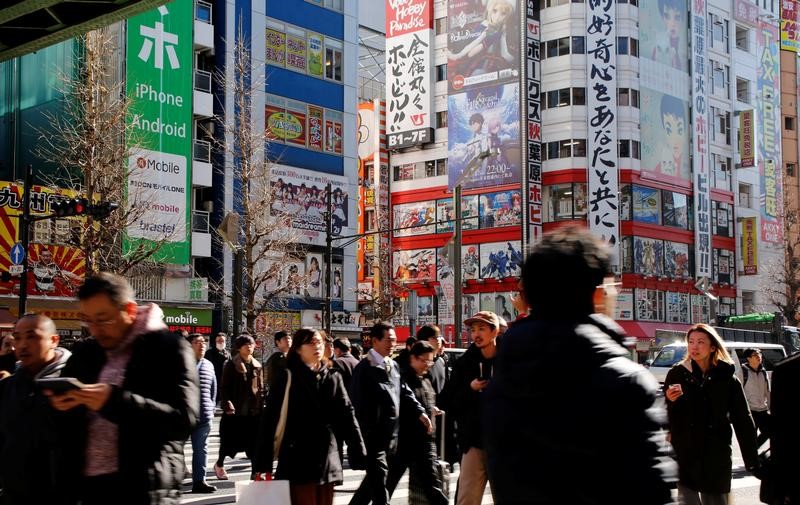By Leika Kihara
TOKYO (Reuters) - Japan's longest run of economic expansion since the 1980s asset bubble may be entering a turning point, with data out on Friday suggesting consumption will fail to drive growth if trade frictions undermine exports.
Household spending shrank 0.9 percent in February from a year earlier, the biggest drop since a 1.4 percent fall in April last year, while inflation-adjusted real wages fell for a third straight month in February, undercutting consumer buying power.
A slowdown in consumption would be an additional headache for Japanese policymakers, who fret the yen's recent rises and fears of a trade war hurt the export-reliant economy.
"External demand and consumption aren't very strong, so economic growth may have ground to a halt in the first quarter," said Takeshi Minami, chief economist at Norinchukin Research Institute.
"The strong yen could hurt exporters' earnings. That's a concern because companies won't raise wages, which means consumption won't fire up."
Unusually cold weather kept consumers at home and heavy snow led to a spike in vegetable prices, which discouraged households from spending on non-necessities in February, analysts say.
The drop in spending confounded a median market forecast for a 0.3 percent gain and followed a 1.9 percent rise in January.
Separate data showed real wages fell for the third straight month in February, reinforcing the view the Bank of Japan's 2 percent inflation target will remain a distant goal and keep the bank from dialling back stimulus any time soon.
COST PRESSURES RISING
Friday's string of data comes in the wake of a BOJ survey that showed business sentiment souring for the first time in two years, suggesting the strong yen and escalating U.S.-China trade frictions are taking their toll on confidence.
Consumption has been a soft spot in an otherwise robust recovery, hampering the BOJ's efforts to achieve its inflation target as firms remain wary of raising prices for fear of scaring away cost-sensitive households.
"The pick-up in consumption seems to be stalling," a government official told a briefing, offering a gloomier view than last month when the government said consumption was recovering.
Some companies are raising prices at the cost of losing consumers, as they face rising raw material costs and a labour shortage that is pushing up temporary workers' pay.
Restaurant chain operator Matsuya Foods (T:9887) hiked prices for its "gyudon" beef-bowls - known as an affordable meal for households and a symbol of Japan's deflation - by 10 percent this month, citing higher costs.
Part-time workers' hourly pay rose 2.4 percent last year, much more than a 0.3 percent gain for regular workers' wages, and grew 1.9 percent in February, the wage data showed.
As the overall income of part-time workers remains low compared with that of permanent employees, the rise in their pay has not translated into stronger consumption, analysts say.
Japanese households' confidence on the economy worsened in March for the first time in over a year as they saw themselves worse off due to higher fuel and vegetable prices, a BOJ survey showed on Thursday.
Japan's economy expanded an annualised 1.6 percent in the October-December quarter, marking the eighth straight quarter of gains, on robust global demand and capital spending.
But core consumer inflation stood at 1.0 percent in February, well below the BOJ's 2 percent target, as slow wage growth keeps consumers from increasing their spending.
Some analysts say the central bank could be forced to cut its rosy inflation forecasts again when it conducts a quarterly review of its projections at a rate review on April 26-27.
